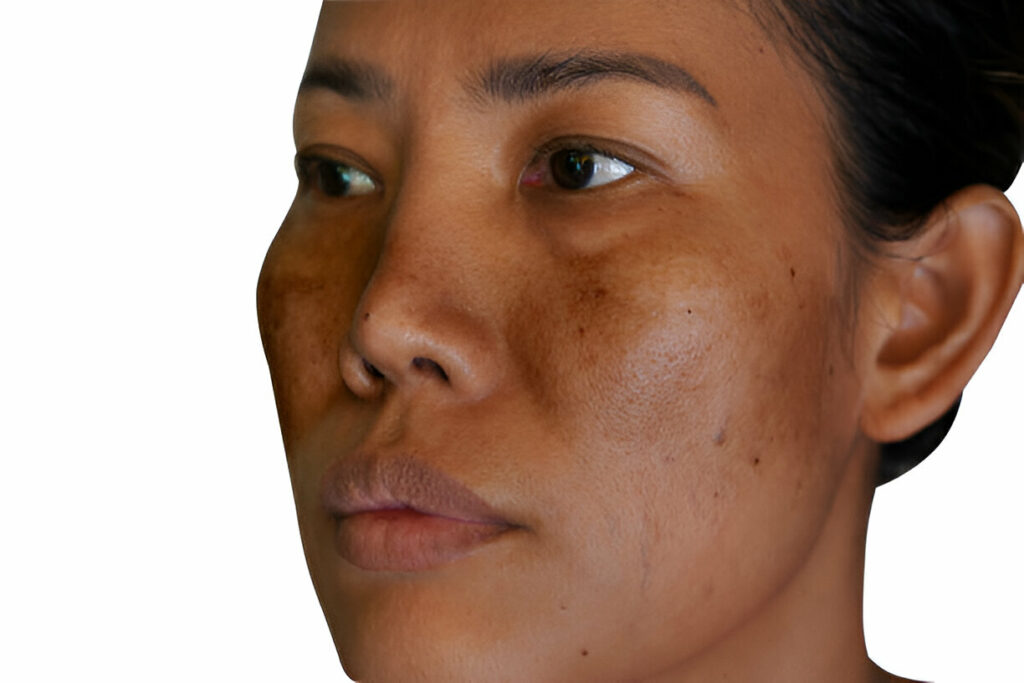108, Shangrila Arcade,
Nr. Shyamal Cross Road,
Satellite, Ahmedabad - 380015
What is Skin Pigmentation?
Skin pigmentation refers to the coloring of the skin, which is primarily due to a pigment called melanin. Melanin is produced by cells known as melanocytes and is responsible for giving our skin, hair, and eyes their color. However, sometimes melanocytes can produce too much or too little melanin, leading to skin pigmentation disorders.
Types of Skin Pigmentation Disorders
- Hyperpigmentation: This occurs when there is an overproduction of melanin, leading to dark patches or spots on the skin. Common types include:
- Melasma: Often caused by hormonal changes, such as during pregnancy or from using birth control pills.
- Sun Spots: Also known as solar lentigines, these are caused by prolonged exposure to the sun.
- Post-inflammatory Hyperpigmentation (PIH): Dark spots that appear after an injury or inflammation of the skin, such as acne.
- Hypopigmentation: This occurs when there is a reduction in melanin production, leading to lighter patches of skin. Common types include:
- Vitiligo: An autoimmune condition where the immune system attacks melanocytes, leading to white patches on the skin.
- Albinism: A genetic condition characterized by a complete lack of melanin, resulting in very light skin, hair, and eyes.
Causes of Skin Pigmentation
Several factors can contribute to skin pigmentation disorders, including:
- Sun Exposure: UV rays can trigger melanocytes to produce more melanin, leading to hyperpigmentation.
- Hormonal Changes: Fluctuations in hormones, especially in women, can affect melanin production.
- Medications: Certain medications can cause pigmentation changes as a side effect.
- Genetics: Some pigmentation disorders, like albinism, are inherited.
- Inflammation or Injury: Skin injuries or inflammatory conditions like acne can lead to pigmentation changes.
Treatment Options at New Touch Clinic
At New Touch Clinic, we offer a range of advanced treatments to address skin pigmentation and help you achieve a more even and radiant complexion. Our treatments are tailored to meet your individual needs and skin type. Here are some of the options available:
- Chemical Peels: Chemical peels involve applying a solution to the skin that exfoliates the top layers, promoting the growth of new, evenly pigmented skin. They can effectively reduce the appearance of dark spots and sun damage.
- Laser Therapy: Laser treatments target and break down excess melanin in the skin. This can be particularly effective for treating sun spots, melasma, and PIH.
- Microdermabrasion: This non-invasive procedure uses tiny exfoliating crystals to remove the outer layer of dead skin cells, revealing fresh, evenly pigmented skin underneath.
- Topical Treatments: We offer a range of medical-grade creams and serums that contain ingredients like hydroquinone, retinoids, and vitamin C, which can lighten dark spots and improve overall skin tone.
- HydraFacial: Our HydraFacial treatment deeply cleanses, exfoliates, and hydrates the skin, helping to improve its texture and tone. This treatment can be particularly beneficial for those with mild pigmentation issues.
To know more, follow this link: https://pmc.ncbi.nlm.nih.gov/articles/PMC10304091/
Why Choose New Touch Clinic?
At New Touch Clinic, we are committed to providing our patients with the highest quality of care. Our team of experienced dermatologists and skincare specialists will work with you to develop a personalized treatment plan that addresses your specific pigmentation concerns. We use the latest technologies and techniques to ensure safe and effective results.
Book Your Consultation Today!
If you’re struggling with skin pigmentation issues, don’t wait any longer to seek treatment. Contact New Touch Clinic today to schedule your consultation and start your journey to clearer, more radiant skin.
- Best Full Body Whitening Treatment
- Full Body Lightening Treatment
- Best Laser Hair Removal Clinic
- Permanent laser hair removal
- Hair Removal in Ahmedabad
- Melasma Treatment
- Naturopathy Treatment for Alopecia Areata
- Full Body Brightening
- Skin Lightening & Whitening
- Carbon Laser Peel
- Hydrafacial Treatment
- Anti-Aging Treatment
- Hair Transplant
- Body Contouring
- Tattoo Removal
- Hair Loss Treatment
- Facial Treatment
- Acne & Scar Reduction
- Laser Hair Removal

For Best Treatment
Get ConsultationConsultation Fee: ₹1000/-
(Consultation fee will be waived if you avail any service or purchase any product.)


